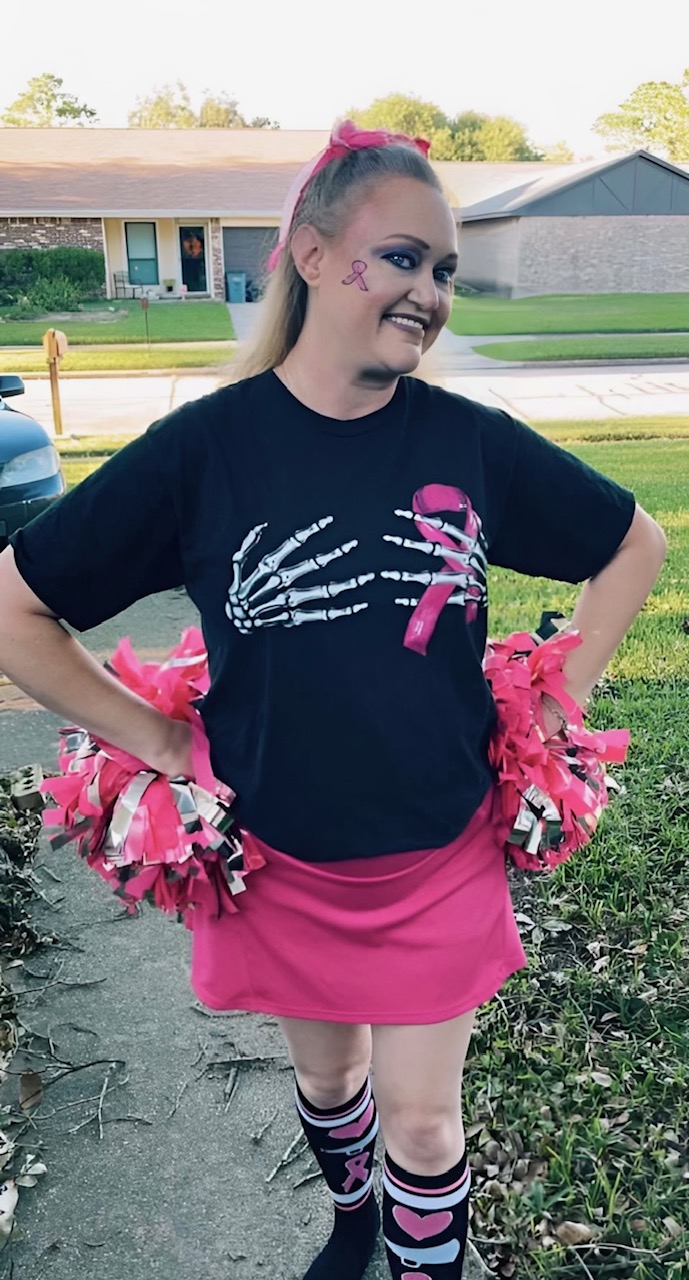Supporting groups and an outstanding care team helped Pamela through her breast cancer journey
Cancer took almost everything from Pamela French. Thankfully, she has a fighting spirit that kept it from taking away her life.
French had her first mammogram in 2020 after noticing that her left breast was considerably larger than her right one.
That realization started a long, painful journey from diagnosis and evaluations to operations and eventually, recovery. But along the way, things were rocky both inside and outside the hospital.
A series of mammograms and ultrasounds revealed a multitude of tumors. In-depth ultrasound-guided biopsies on her breast and lymph nodes were so painful, she said, that she needed help getting dressed afterwards.
Eight days later, the news came that she had cancer but that it hadn’t spread to her lymph nodes. Then, the journey to find a way to pay for her care led her to the University of Texas Medical Branch (UTMB Health).
She met with a patient navigator who put her mind at ease and created a care team that included Dr. Colleen Silva, a professor and the medical director of Breast Health at UTMB Health, and Dr. Julie Park, a professor and the director of the UTMB Health
Breast Reconstruction program.
“I instantly loved them both,” French said. “They were both so helpful. Dr. Silva gave me the answers that I needed, but it wasn’t what I wanted to hear. She said that I either had a secondary cancer or I had a very rare type of
ductal carcinoma because it was both inside and outside of my ducts.”
Dr. Silva likened performing a biopsy on French to “taking a piece of paper and sprinkling salt on it and all those could either be a calcification or they could be cancer cells,” she said, adding that the recommendation was a full mastectomy.
Pamela didn’t require chemotherapy after her surgery, so Dr. Park was able to begin breast reconstruction for Pamela.
But between her diagnosis and what was to be her last surgery, French lost her job, her income, her home, her 12-year-old dog and her breast. She went through a divorce and also lost a close friend.
“I was just destroyed when I had that surgery, which was supposed to be my last one,” she said. “I was supposed to be getting on with my life, and I was so happy.”
But then she contracted a potentially deadly blood infection that required emergency surgeries to clean out the reconstructed breast tissue and start over.
French’s last reconstructive surgery is scheduled for Oct. 14. With the bad news and rough patches behind her, she’s happy with where she is.
“My body looks amazing,” she said. “You cannot tell that I have one breast that’s been reconstructed and the other one is mine. They told me from the beginning that I would look good in clothes but wouldn’t look as good naked.
But I look good naked. My body looks great. I feel great. This process has been a long journey and I’m finally getting to where I have my life back.”
A friend of French’s who was dealing with stubborn, recurring breast cancer told her that she refused to be “the sick girl” — a sentiment French took to heart.
“I set my mind to it that I was not going to be the sick girl,” she said. “I was going to be healthy, and I was going to come out of this. With lots of prayer and lots of God’s grace, I did.
French is a passionate advocate of getting mammograms even earlier than the recommended age of 50. Her advice to women going through the journey is to surround yourself with others who have gone through it.
Those “pink sisters,” along with her mother and daughter, are what kept her going, French said. No two cancers are alike — even if they are the same kind of cancers — but survivors can tell you what to expect every step of the
way and will be there for you, she said.
“There were times that I would cry out to God, ‘Please just take me’ because it was so painful,” she said. “The people I thought would have been there for me, like my husband and some people who were close to me, were not.
But people I hardly knew stepped up.
“Get with people who are walking the same path,” she said. “I got into some support groups and we get together, we have dinner. We go to games; we go do things just with the pink sisters. I don’t know that I could walk this path
without them. It was the best thing I ever did.”
Learn more about UTMB Health’s Breast Health program
This feature first ran as a story in the 2022 Think Pink special section of the Daily News. You can view the full publication online or download the PDF .